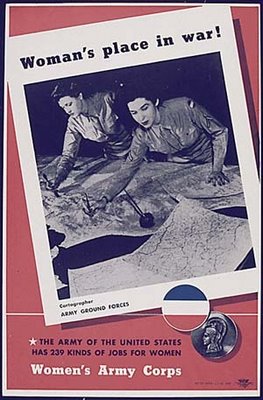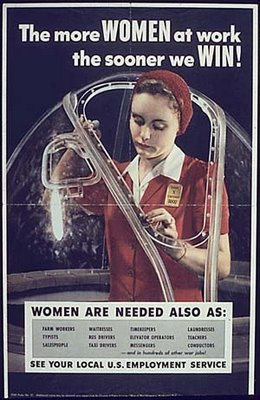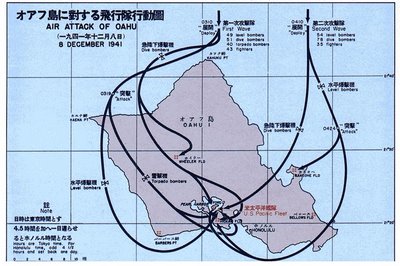Today is the 65th anniversary of the surprise attack by Japanese forces on the US naval base at Pearl Harbor on the Hawaiian island of Oahu, Sunday, December 7, 1941. A date, as President Roosevelt said, "which will live in infamy."
A Japanese naval force had steamed undiscovered entirely across the Pacific, launching the surprise attack at dawn from north of the island, with the first wave hitting at 7:55 AM.
America's Pacific Fleet was dealt a crippling, though not fatal, blow, with 2,408 servicemen and civilians losing their lives. Most of the fleet lying in the harbor was sunk or destroyed.
As luck would have it, the three aircraft carriers stationed in Hawaii were not in port and escaped unscathed. These carriers, along with onshore facilities that escaped destruction, formed the basis for American recovery and eventual victory in the Pacific theater.
On Monday, December 8th, 1941, the day after the attack, President Franklin Delano Roosevelt addressed an emergency joint session of the Congress, asking for a declaration of war against Japan.
That declaration was passed with only one dissenting vote, and FDR signed the declaration later the same day.
Americans rallied in support of the nation, with thousands lining up to enlist voluntarily.
Women would come to play an important role in World War II -- more important than ever before -- through enlistment in women's auxiliary forces and in massive participation in the war industry effort.

(Women played important roles in the military effort)

(America could not have produced the materiel needed without women)
The war would also forever change the situation of African-Americans in American society.
Black Americans would make great strides to leave behind the legacy of invisibility fostered by social norms, taking a proper place in the leadership of the war effort, though not without struggle.
America -- and the world -- would never be the same.
Today, those who were young men and women at that time are being lost at the rate of a thousand a day.
Their contribution was priceless. Their stories deserve to be heard, preserved and shared.
If you know a veteran of World War II, consider reaching out to them today to tell them how much you appreciate their sacrifice.
And listen to their story.
-- Dan Damon
Links of interest --
- FDR Library: "Franklin Roosevelt asks Congress for a Declaration of War with Japan"
- Naval Historical Center: "Pearl Harbor Raid, Overview and Special Images"
- National Geographic: "Remembering Pearl Harbor"
- Wikipedia: "The Attack on Pearl Harbor"
- Tuskegee Airmen: "National Website"
- Wikipedia: "Tuskegee Airmen"





1 comment:
In the mid 70s, I worked with a USS Arizona Survivor, Henry Cruz. Being in my early 20s, I didn't realize at the time how fortunate I was to hear his first hand accounts of the attacks.
The last record I've found of him attending the reunion at Pearl Harbor was in about 1985, and I fear Henry has gone the way of most of his contemporaries. The memories of his stories live on.
Post a Comment